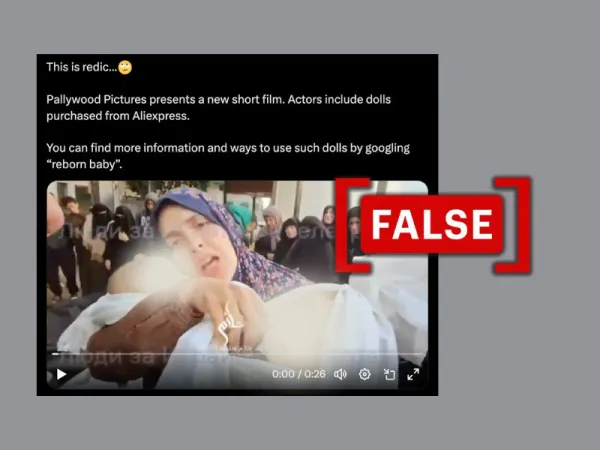By: Soham Shah
March 8 2024
Dead infants from Gaza called dolls and ‘Pallywood actors'

Post claiming video shows 'Pallywood' actors crying over dolls and not dead babies. (Source:X)
The Verdict False
The video shows Rania Abu Anza crying over the bodies of her infant twins who were killed in an Israeli air-strike in Rafah, Gaza.
(Trigger Warning: This story contains descriptions of distressing visuals. Reader discretion is advised.)
What is the claim?
A video of a woman crying and holding an infant's body while repeatedly kissing another baby held by a man standing next to her is going viral on social media platforms X (formerly Twitter) and Facebook with the claim that these babies are not humans but dolls. It is being further claimed that this is another example of 'Pallywood' actors. 'Pallywood' refers to a dehumanizing narrative used against Palestinians to dismiss the veracity of media presented as evidence of civilian harm in Gaza and the West Bank amid the Israel-Hamas conflict.
The caption of one such post read, "This is redic...🙄Pallywood Pictures presents a new short film. Actors include dolls purchased from Aliexpress. You can find more information and ways to use such dolls by googling "reborn baby (sic)." Archived versions of such posts can be accessed here, here, and here.
Viral posts claiming the visuals show dolls and not bodies of slain infants (Source:X/Screenshots/Modified by Logically Facts)
We found that this claim is bereft of facts, and the visuals show actual dead bodies and not dolls.
What is the truth?
We noticed that the viral video had the watermark' Hazem Suleiman' overlaid. Suleiman is a Gaza-based journalist and had shared the same video on his Instagram account on March 3. The text overlaid on the Instagram video read, "After 10 years today they and their father Wissam were martyred."
We also found other photos of the same lady holding her dead kids on this handle. One photo was captioned, "This mother loses her twin children after waiting more than 10 years and loses her husband as a result of the bombing of their house in the city of Rafah."
Photo of Rania Abu Anza with her kid’s bodies uploaded by Hazem Suleiman. (Source:Instagram/@hazmaslman)
Further, we found news reports by Reuters and the Associated Press (AP), which also detailed the death of these kids. Reuters reported on March 3 that twins Wesam and Naeem Abu Anza, born just a few weeks after the conflict in Gaza started, were killed in an Israeli air strike in Rafah, South Gaza. The video reports carried visuals of the grieving mother and an interview with her. It also carried blurred images of the dead infants.
The report by AP, updated on March 4 also reported how after 10 years and three rounds of IVF, Rania Abu Anza was able to conceive and give birth to twins. An Israeli air strike killed both the children, her husband, and 11 other relatives, the report added. "They were all dead. Their father took them and left me behind," Anza was quoted as saying in the report.
Logically Facts reached out to Hazem Suleiman, who provided us with similar details. He also mentioned couple Wissam and Rania's 10-year-long wait to have kids. He said allegations of the kids being dolls are "false and baseless."
The 'Pallywood' narrative has been employed multiple times to claim that visuals of dead Gazans are fake and show dolls. Logically Facts has previously debunked such false claims besides writing about the proliferation of civilian harm denial in Gaza with the 'Pallywood' narrative.
The verdict
We have marked this claim as false as multiple news reports confirmed the death of the twins seen in the viral video, as did the journalist on the ground in Gaza who initially reported on the incident.


